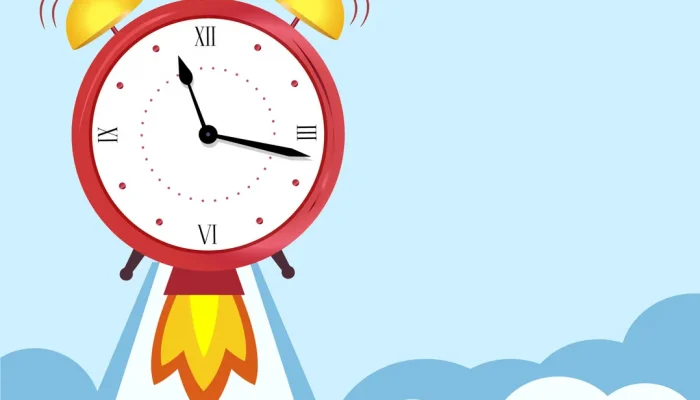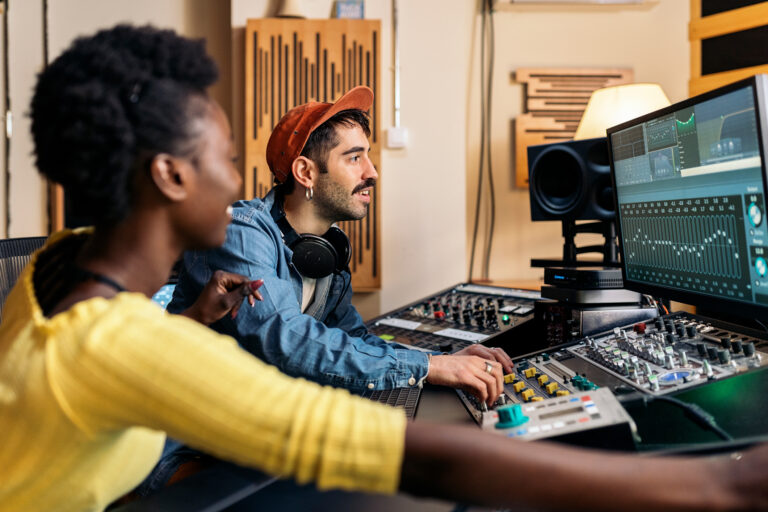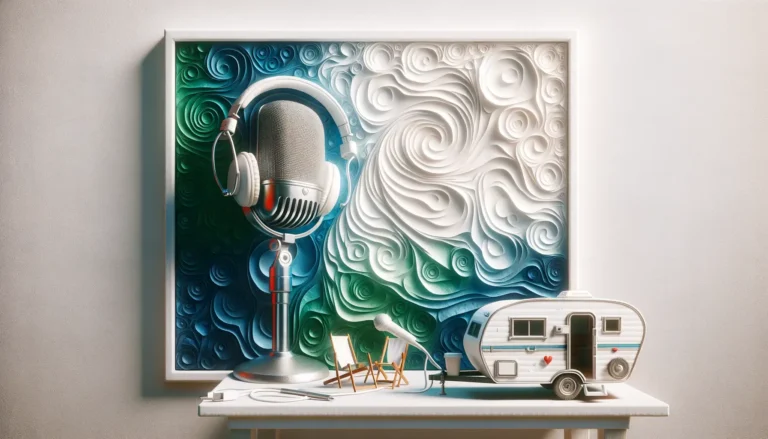One of the best bits we hear from clients when we make a show together is how making the podcast became their favorite project to work on that year.
But for every one of these satisfied creative brand partners, there are likely scores more out there who aren’t sure they can make a good show. They might have a germ of an idea, but for whatever reason, they’re not finding the right time to pitch it to their team. So they set it aside. They “snooze” it.
Megan Tan understands that putting things off — hitting snooze — is part of being human. The talented podcast creator scored an early career home run with her seminal podcast series Millenial, a deeply personal narrative about coming of age. But the project left her emotionally and physically burned out. She wasn’t eager to do that again. She pushed away any urge to get in front of the mic again.
“I struggled a lot with it towards the end... 80% of it is fruitful and beautiful, and then you get this 20% that is just awful bad taste in your mouth. And for some reason, it’s so easy to think that the 20% was the whole 100%.”
So Megan focused on producing behind the scenes for a while. After working on a series called California Love in 2020, the urge to get back in front of the mic hit her more strongly than ever. She next dipped a toe into the hosting waters with an especially beautifully told episode of finding love in the pandemic for another show, Wild (check it out, it’s really something). And with that, it was time to stop pushing away this goal.
“I stepped into the strength and confidence of my voice again. So pitching a show where I was the host was the next step.”

The result of that is a new hit series about things people keep putting off, appropriately called Snooze. And though the subject matter conveniently aligns with Megan’s own choice to “un-snooze” her hosting skills, it’s not a vanity project. It takes a full team of creatives to find the right stories and tell them as best they can. And it’s within that team dynamic that we can all learn how to un-snooze our podcast ideas, build a team, and make a great show.
First: Don’t Snooze On Your Idea Until It’s Perfect. It Won’t Ever Be.
Megan’s been pitching stories and shows for years. Rare is the show pitch that can answer every narrative, editorial, audience, and brand strategy need. Pitch it anyway, because no one else has the same idea as you.
“I don’t focus on the ‘end result.’ I focus on making work that is true to my mission as a creator and contributor to the world, and also something that serves a specific audience.”
And you’ll soon see that many are eager to help you bring that idea to life. Your colleagues. Your friends. Us…
Next: Remember Why You Need To Make This Show, And Why Only You Can Make It.
We often counsel the brands we work with to think through what kind of podcast only they can make. What brand superpowers can they flex? What expertise, guests, industries, and communities can they tap into that no other brand can?
The same is true for every individual within those companies. What superpowers do you bring to your company that can inform a fresh approach to a podcast? What values do you share with your brand that can shape the voice of a show?
For Megan, what drove her vision for Snooze was a need to inject more hope in our lives.
“In a world where it feels like reality continues to be stark and chaos continues to swirl around us, I needed to be reminded that the majority of people around us have hopes and dreams. Blocks and fears. And by hearing one person undergo their inner transformation to become the person they want to be, we’ll all be inspired. We’ll have hope.”
Help Your Team Help You Turn Your Dream Show Into A Real One.
So you pitched your great idea, got some useful feedback, and now you want to nail the idea down. Your team is here to help you bring it to life — but they can only do that if you make the effort to download your vision extra clearly. And be specific.
“You’re taking all these things in your brain and you need to scale them, but to scale, you have to articulate and you have to be very clear and direct. No one’s gonna know what’s in my head.”
Megan says she learned this the hard way, after showrunning too many episodes where she assumed her producers understood the assignment and could run with it. They didn’t.
“For instance, I love to lead with sound…the door opens, you’re in a room and then the narration comes and you give context to where you are through writing. And so if I just said that up top [to my team], ‘this is what’s gonna make a Snooze episode a Snooze episode,’ then not only would the team be able to be [say], ‘oh, I can do that on my own,’ because they know what to expect, but it would save us so much time in terms of editing.”
Now: Identify A Single Person As Your Audience And Make The Show For Them…
A show for everyone is a show for no one. I’ve shared this advice countless times, and continue to remind myself of that mantra with every show I make. That podcast idea of yours? Who do you picture in your mind as the ideal listener of that show? What does that person need to hear? Take another tip from Megan: pull in your team and do this exercise together.
What do they look like? What’s their routine? Play it out.
“When we first start coming together, I always like to ask people ‘who is this for?’ That helps figure out what to explain [in your show], what you don’t [have to]explain, what the tone is, what the tone is not. I literally would put this person’s photo up on my computer to feel like we’re telling these stories that resonate with their life.”
… Because Your Audience Is A Collection Of This One Person, Many Times Over.
The reason picturing one person as your listener is useful has to do with the power of audio storytelling: it’s an intimate medium. When your podcast resonates with one person, the connection you make between your show, your brand, and your listener, pays itself forward. The truth is that the show’s audience is made up of thousands of individual listeners. So give your imagined listener something unique that entertains them, teaches them something new, and inspires them, and the rewards grow exponentially as your listeners engage with your show.
“Even if you impact one person, that person will impact many people. So who is this for? When I think about the people outside of my own life, outside of my ego, I can see the work that I’m doing as a gift.”
And Remember, Your Show Works For The Brand. But You Work For The Show.
When you work on a podcast, you work on the podcast. Whether it’s a show you make for the company you work for or a show you make just for yourself and your friends, every decision you make is in service of that podcast and its audience.
“I have a post-it note that literally says YOU WORK FOR THE SHOW. Everyone on the team is working for the show.”
It may sound simple and obvious, but when everyone on the team thinks this way, the path to creative differences and production conflict is much simpler.
“Even when I’m a showrunner, I’m not, ‘I need this from you.’ Everything is, ‘so the show needs you to meet these deadlines.’ And I just always try to make everything in service of the show.”
This loyalty to the show is especially important when internal partners make suggestions that could fundamentally alter the vision for your show in ways that distract or break your promise to your listener. If the request doesn’t “work for the show”, it’s easier to find ways to acknowledge, adapt or push back against those suggestions.
You Don’t Have To Revolutionize Podcasting. Your Team Will Make It Special.
At its simplest, the Snooze format is a classic narrative structure known as the Hero’s Journey — a central character heads out on a quest, is challenged, overcomes that challenge, and returns a changed person. It’s a classic structure. It’s not what makes the show special.
“I’m not reinventing what is inherent. The design of Snooze exists everywhere. The thing that makes it different is that it’s going through my lens and the Snooze Squad (Erick Galindo, Marina Peña, Jessica Pilot, Kyle Chang, Donald Paz, Emma Alabaster, Anjuli Sastry Krbechek) lenses as well. And that’s what makes Snooze unique.”
When you make sure your team is made up of a diverse group of people with different life experiences, histories, and creative strengths, the creative output that emerges from that team helps give your podcast a voice unlike any other out there. So push for it when you can.
Finally: Working On Your Brand’s Podcast Could Be The Most Fun You’ll Have At Work All Year.
I hope that’s something you get to say at some point in your career, and that I’ve helped you feel that way. Don’t overthink your idea. Say it out loud, reach out to people who can help you give it shape, and make it great. Take it from Megan Tan’s own hero’s journey back into hosting, and making a new, deeply creative series:
“I felt it in my bones. Like if I didn’t do it, I would regret it for the rest of my life. And, I would be miserable in my place of work.”
Check out Snooze when you have a moment, and find Megan Tan on Instagram.
Sign up for the Pacific Content Newsletter: audio strategy, analysis, and insight in your inbox.




